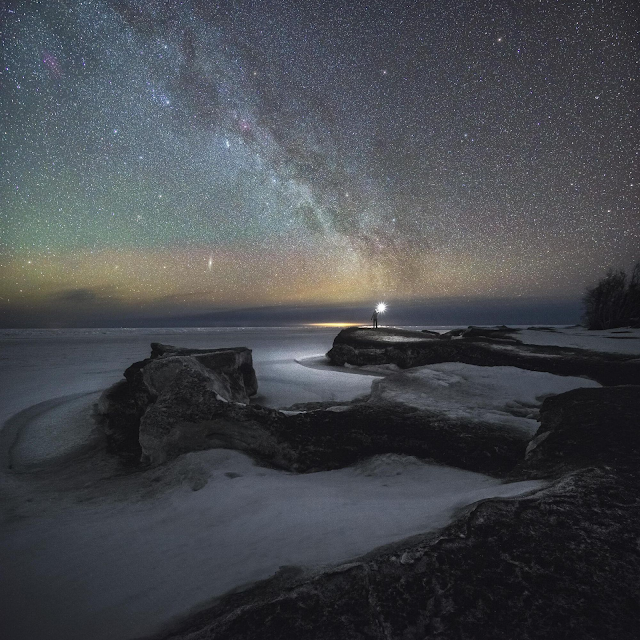
Beyond the beyond, you lurk behind the start
Of the times. Mystery is the skin that wraps
Your body (if you have one). In the pillar of
Cloud and the blazing bush, we heard you speak.
Like imprints, your footpaths are engraved on
The faces of rocks. Horeb said he accommodated you
And Nebo testifies to your visit. Red Sea said
your finger tickled a parting across like a barber’s
Clipper and like the wall of Jericho, permit you.
If I get you looking at me, God!
I’ll chat you with a billion lips of “how?” How?
After Okopi, did you pass life as a gas into the
Cave of Adam’s nose? A statue for multiplication.
And how did you carve him? Like an artist, you are?
A sculptor? Perhaps, a form-er. Perhaps, a build-er
Yet, your name isn’t Bob but a beautiful bard
You are. As a create-or. Tell me something, God!
Dear God, tell me how. How did you wire the
Bulbs you affixed on the chest of this vast
Canopy that marks the parting between you
And Cosmos? How did you put the bright smile
On the face of the sun and the dim fluorescence
As the countenance of the moon? How did you
Levitate land from the belly of the deep? When
After the fish, we fry for food and maggots munch
On man, will you hold me by hand and survey
Your cubicle to tell me how?
Video Comment - My mom sang this to me when I was a little kid in my room. I must of been around 5? I don’t remember how old I was exactly, but I do remember how she sung it. I have a plaque with the words of this song hung on my wall in my room. I remember asking her what it was, as I never knew. She told me that it was a song. I asked her to sing it, so she did. I was little, but I still remember to this day in exact detail of that moment in my room. I remembered each note in my mother’s voice. The way the gentle sunlight flowed through my room and shined upon her. 12 years later, I still remember looking up at her singing this beautiful song. Knowing what that plaque in my room finally meant. I even remember the exact pitch, and could sing it in the exact key my mother sang it in all those years ago. I only just searched the song 12 years after to see if my memory held true. It did. The thing is, I only heard this song sung that one time. And I remembered it. At 5... 5 year olds don’t do that people. I like to think of that moment as the most special moment given to me by God in my life. And how I can vividly recall how my mother looked that day with the sunlight on her hair, and how she sung the song, in her beautiful voice. I’ve never experienced anything like that since. It’s a memory that I hold so dear to my heart. And I felt that God was in the room at the moment. Like he was the sunlight shining on my mom. I think he was.
 |
| amazon link |
In Doxology, Dave Siefert pours out praise to God for his many blessings and points the reader to the need for faith in Jesus Christ alone for eternal salvation.
DOXOLOGY brings encouragement to those facing difficult circumstances, and gives hope to those who are spiritually searching.

Praise God from whom all blessings flow;Praise him all creatures here below;Praise him above, ye heav’nly host;Praise Father, Son, and Holy Ghost.
These 25 words, known to many around the world today as “The Doxology,” comprise what is likely the single best-known verse of all Christian hymnology and poetry.
On the surface, these lyrics are surprisingly modest and memorable. Few of us remember first hearing them, and few recall straining to learn them. Yet, as simple and accessible as these four lines are, Christians have been singing them now for more than three centuries. Because simple doesn’t mean shallow. Plain does not exclude profound. Which is one of the striking truths at the heart of our faith — and one of the great evidences for its truth — from the Gospel of John, to the early creeds, to the most widely known and enduring lyrics we share with the global church today.
“The greatest realities about God and his world can be captured in the humblest of terms.”
The greatest realities about God and his world, when understood aright, can be captured in the humblest of terms, even as they are bottomless in their depth. And yet we find an enduring quality in “The Doxology” absent from many of our passing modern choruses. Substance hides in the brevity and singability. Though short, the hymn is a coherent progression, rather than a loosely connected attempt at memorable phrases, and turns on the profound theological truths of God’s aseity and generosity, and God as Trinity.
Morning, Evening, Midnight
Thomas Ken (1637–1711), who crafted these plain and profound words in the late 1600s, wrote them as the final and “doxological” stanza of three hymns he published, first for students at Winchester College at Oxford University.
Ken, who was an Anglican minister, royal chaplain, and eventually bishop, first penned verses for his students at Winchester to sing upon arising in the morning, and at bedtime each evening. Later he added a third hymn, to rehearse at midnight, were students to have trouble sleeping. Each hymn was a confession of faith, and an invocation of divine blessing, tailored to its particular moment of the day. And each hymn ended with the same 25-word doxological verse in praise of God, three in one.
Ken’s hymns have by no means been lost today. However, it is his final verse — our beloved “Doxology” — that has endured, so well-known is it that it needs no placeholder in our hymnbooks. Christians the world over simply know it, almost without fail — both Ken’s timeless words and the tune, which Ken did not write, but which much later began to accompany the song. The tune, called Old One-Hundredth, originally designed to accompany the singing of Psalm 134, and later Psalm 100, first appeared in the Geneva Psalter in 1551 and was written by Louis Bourgeois (1510–1561), who served as head of choirs and music, alongside famous pastor and theologian John Calvin.
Source of All Good
What, then, has been the power of these 25 words? Why have they endured, and for many become one of the most basic and repeated expressions of the Christian faith?
For one, our God is indeed the one from whom all genuine blessings flow. He himself is the Blessed One (1 Timothy 1:11; 6:15), the only one in whom is fullness of joy and pleasures forever (Psalm 16:11). Yet, unshakably happy as he is, he is not a God inclined to keep to himself but gives generously. He is happy enough to be outgoing.
God delights to give, to overflow with joy, to bless his creatures and share his own happiness in them and then with them. He is the giver of “every good gift and every perfect gift” (James 1:17). “From him and through him and to him are all things. To him be glory forever. Amen” (Romans 11:36).
Three in One
This blessed God is also sovereign over all. He is both the singular source of all true good, and he is the Almighty. He is the Creator and Sustainer of all nature, and all the heavenly hosts above, and “all creatures here below.” Here and there, above and below, he is God and “does all that he pleases” (Psalm 115:3). As the great humbled king of Babylon learned to declare in his own doxology, our God “does according to his will among the host of heaven and among the inhabitants of the earth; and none can stay his hand” (Daniel 4:35).
“God is glorified in our heartfelt expression of praise. God made us for praise. He made us for doxology.”
Still, this God, utterly complete in goodness and power, has revealed himself to his people. He is one and three — one God, three persons, working in history to redeem and restore his people from their sin and rebellion. He is a God three times for us in a great salvation, which is arranged by the Father, accomplished by the Son, and applied by the Spirit.
And so, we praise him as three in one, and one in three, just as we baptize “in the name of the Father and of the Son and of the Holy Spirit” (Matthew 28:19), and pray with the apostle, “The grace of the Lord Jesus Christ and the love of God and the fellowship of the Holy Spirit be with you all” (2 Corinthians 13:14).
Our Joy, His Glory
Praise Father, Son, and Holy Ghost. “The Doxology” has served as a ready-made form, and occasion, for Christians to connect the very purposes of God in all he does with our heart’s deepest desire. God made our hearts to ache for happiness. And he made the world, and us, to glorify him. And in this act of praise (which “The Doxology” directs and assists), our souls both rejoice and go public in expressing their delight in him.
God is glorified in our heartfelt expression of praise. God made us for praise. He made us for doxology. He made the world that he might be praised. And these simple yet profound words serve that simple yet most profound human act of devotion — and all the more when we join our voices and sing together.









